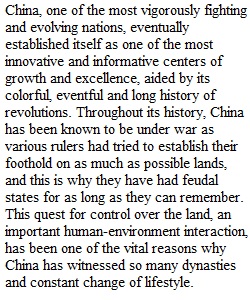


Q Module 2 Discussion: History Veeck and Pannell (2016, 50) present us with a useful geographic perspective with which to approach the study of China's history, namely with focus on (1) the spatial organization of people and activities in China, and (2) the implications of human-environment interactions. Building on last week's and this week's readings, employ this geographic perspective to generally explain the human-environmental histories of (i) the Shang dynasty, (ii) the Silk Road, and (iii) the Cultural Revolution. Here, your answer should specify how particular social advances were made because of or without attention to the natural resource conditions at hand.
View Related Questions